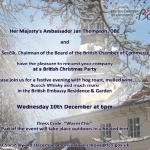
I hope my regular readers will forgive me for tackling a current political issue. However, as Ukraine is almost on the doorstep of the Czech Republic, I thought it appropriate to reflect on how the current crisis is seen here, and the impact the crisis may have in the near future.
Before proceeding any further, I should point out that it is not quite as close as one American TV news channel tried to illustrate. MSNBC successfully reinvented Czechoslovakia, a country that ceased to exist on 31st December 1992, and showed it as bordering Ukraine as can be seen in this link. Just to confirm, whilst Slovakia does border Ukraine, the Czech Republic does not.
What may surprise many people is the fact that Ukrainians are by far the largest group of immigrants by nationality, living and working in the Czech Republic. According to the 2011 census, there were 118,000 Ukrainians resident here. The same census also registered 36,000 Russians as being present in the Czech Republic. However, there is quite a contrast in what each nationality group does here.
Most Ukrainians do what many relatively newly arrived immigrants do in so many countries around the world. They do the jobs that the host countries own citizens don’t want to do. In the Czech Republic this means that they work as building labourers, street cleaners or washing up and cleaning in bar-restaurants. Often they send home some of the money they earn, to support their families living back in Ukraine.
In contrast, most Russians living here are quite wealthy. As I’ve written previously, they are mainly responsible for parts of the more seedy side of life here such as Herna (gambling) Bars and prostitution. Of course there are Russians living in the Czech Republic, whose main purpose in being here is just to keep well clear of Putin. Inevitably, all Russians get tarred with the same brush, especially during this current crisis.
There is a general, considerable Czech dislike of Russians, because of past history. Czechs quite rightly, see little difference between the former communist-led USSR and present day Putin-led Russia. Both are seen as wanting to dominate and control the neighbouring states of Central and Eastern Europe, either by military or economic means – often a combination of both.
The current situation in the Crimea peninsula, has many echoes of the events of August 1968 here in the Czech Republic. By the will of the people, there is a change of government to one that is not to the liking of Moscow. So the troops are sent in to seek to reimpose Russian control and influence. In 1968, certain members of the Central Committee of the Czechoslovak Communist Party are supposed to have invited the Soviet Red Army to invade the country. In 2014, Putin’s government claim that former President Viktor Yanukovych, invited Russian troops to intervene in Ukraine, before he was deposed.
There are also wider historical echoes to the origins of the Second World War, with lands that are part of the present-day Czech Republic, being central to the dispute that eventually led to the outbreak of hostilities. As I’ve previously written, when the new nation of Czechoslovakia was established in 1918, the country included many people of German ethnic origin. According to a census taken in 1921, just over three million Germans lived in Czechoslovakia accounting for around 23% of the country’s total population. The areas where Germans formed a majority were known as Sudetenland and the people themselves as the Sudetendeutsche.
During the 1930s, Nazi Germany, led by Adolf Hitler, actively encouraged dissent among the Sudetendeutsche, hoping to provoke a reaction from the Czechoslovak authorities. The aim was to provide justification for military intervention, ostensibly to protect ethnic Germans. This is exactly what Putin-led Russia is doing presently in the Crimea peninsula. Putin claims he is only protecting ethnic Russians but at the same time, he is actively encouraging confrontation with Ukrainians, hoping to provide justification for his actions.
Hitler got his way without needing to forcibly invade. Because of the policy of appeasement adopted in Munich at the end of September 1938, by Neville Chamberlain and his French counterpart Édouard Daladier, Nazi Germany took control of the Sudetenland, without needing to fire a shot. To most Czech people and to me, the parallels are very apparent. Allowing a Putin-led Russia, to take control of the Crimea peninsula because it has a majority ethnic Russian population, will not solve the problem. Instead, it will embolden Putin, to seek to take control of further territory, with the ultimate goal of effectively re-establishing the USSR as an enlarged Russian Federation.
Whilst I thoroughly disapprove of the actions of President Putin, Western leaders, particularly those of the USA and the UK, have a serious problem. When either President Obama or Prime Minister Cameron, point out that Russia has invaded a sovereign country in breach of international law, Putin responds by pointing out that the USA and the UK did exactly the same thing, when they invaded Iraq in 2003. Neither side can claim to hold the moral high ground.
So far, both the United States and the European Union, have adopted a series of economic measures to try and force a change in Russian policy. Fortunately, the weather is helping them. The main economic lever the Russians have, is that much of Central and Eastern Europe relies on Russian natural gas and oil, for heating. But because of the most mild winter of recent memory, stockpiles are high and the winter is coming to an end. With the Russian rouble at an all time low, Putin may be forced to make concessions to keep Russia economically afloat. We shall see. All one can be certain of is that a period of great uncertainty lies ahead.




Well written, Ricky. Thanks for the big picture from a CZ perspective.
Thank you for your compliments, Michael.
Good assessment, Ricky. It’s been interesting reading coverage of the crisis in the Moscow Times- so markedly different than what’s coming from our Western outlets. (Understandably so, considering the severe lack of press freedom.)
As a side note, our Model UN kids here in Athens, as part of a Disarmament and National Security Committee, voted yesterday on making Crimea an independent state, and it failed 28 to 30.
Thank you, Emily. It’s also been interesting hearing from one or two teachers in International Schools here in Prague, who have Russian children in their classes & how the issue is being played out in day-to-day school life. I wonder if you’ve had to face this at all? Fascinating vote result from your Model UN kids.
Well done and thank you for such an insightful piece! On a lighter note (and concerning “our Ukrainians”): one might even say that the Ukrainians in the Czech Republic do the jobs the Czechs do in the United Kingdom 🙂
Thank you Martin. Your lighter note is something I nearly wrote in the original post. Additionally, in the UK, Czechs are assisted in the task by Slovaks, Poles & citizens of the Baltic States.
Oh, I just noticed that the smiley face I intended to add to my first comment actually comes out as a sad face – that is a mistake, that little yellow face was supposed to smile, like this 🙂 I find nothing fundamentally sad or inappropriate about this situation, as far as all those concerned are happy about it, which, on the whole, largely seems to be the case. Not surprisingly, I know quite a few Czechs (and Slovaks and Hungarians and, of course, Poles) who were/are working here and hope soon to become one of them (the nature of my work being still the big unknown but I will keep you informed 🙂 ).
Mistake now corrected, Martin 🙂
Well done, Ricky. As is evident by the CNN report, too many US Americans know little about central Europe or could care less! Thanks for a clear, concise snapshot of the situation.
Thanks for the compliments, Marty. As for your second sentence, I’m glad an American wrote it & not me 🙂 But I concur with your sentiments. Slight correction – it was MSNBC, not CNN.
Another trouble with identifying Putin’s actions as a breach of international law is that such an act then demands a (military?) reaction, which I think most of the US and UK public would be hard-pressed to agree with. That’s the reason most genocides are not identified as “genocide” until they are over, because governments could not justify NOT intervening in an ongoing genocide. I think we are also all glad that the winter has been mild and reduced the need for Russian-supplied gas and oil.
I understand how all Russians are “tarred with the same brush” and that Russians are resented and suspect in Czech eyes. I wonder how the local Orthodox Church population is seen by the Czech public; are the Orthodox simply considered an outpost of the Russians or are the Czech Orthodox considered to be an independent voice/presence in the Czech religious community?
You are right Stephen – there would be great difficulty in getting public agreement to military action by the US or UK public after the disasters of Iraq & Afghanistan. Hurting Russia economically is a much better option.
With regard to the question in your second paragraph, I can’t really give you an answer.
In the US, the Orthodox Church is fairly invisible although I heard one (!) radio interview with 2 Orthodox clergy about the crisis in Ukraine. I am always interested in knowing how the Orthodox Church is perceived in other cultures, especially in the countries of the former Soviet bloc.
Stephen – the Czech Orthodox Church is also fairly invisible as it is quite small. I think it is more ignored rather than being perceived as anything. Certainly, being ‘Czech’ & not ‘Russian’, is to its advantage at the present time.
A fascinating post, Ricky, which really filled out my understanding of how the situation in Ukraine is perceived in central Europe. As someone who watched with horror the TV coverage of the crushing of the Prague Spring in 1968, the parallels with the Ukraine haven’t escaped me.
Thank you for the compliment, Perpetua. This post seems to have been widely appreciated as you can see from the earlier comments and the number of Facebook ‘likes & shares’ and being tweeted a few times. Certainly the parallels with 1968 & with 1938 are very much at the forefront of the minds of Czech people at this present time
Very interesting blog on Ukraine, it’s well written.
You could mention that another reason that Putin believes that Western leaders are being hypocritical, is that Kosovo was part of Serbia and against Belgrade’s wishes, it was hived off into a separate country by Western countries.
International law states that a province/region of a country cannot be annexed or become a separate entity without the approval of the government of that country. That’s why Catalonia will never become independent because Madrid must approve it first and that will never happen.
Thank you Peter, especially for turning your original email to me, into a comment here as I suggested.
Your Kosovo example is a very valid one and is cited by Putin as Western leaders picking & choosing as to where international law should or should not be enforced.
Ricky,
I’m sure it’s just a typo, but ‘peninsula’ is the noun and ‘peninsular’ is the adjective. As you’re so hard on the Czechs on their solecisms with our language you would probably like to correct it.
As always, I enjoyed your blog.
Best wishes
Tim
Thank you sharp-eyed Tim! Another example of where a spelling checker doesn’t pick up the mistake as both ‘peninsula’ and ‘peninsular’ are legitimate words. I have now duly corrected my solecism. Glad to know you enjoyed the blog.